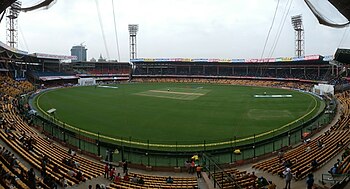This article needs additional citations for verification. (October 2012) |
 Inside view of the M. Chinnaswamy stadium | |
| Ground information | |
|---|---|
| Location | Mahatma Gandhi Road, near Cubbon Road, Shivaji Nagar, Bangalore, Karnataka, India - 560001 |
| Home club | |
| Establishment | May 1969 |
| Capacity | 33,800[1] |
| Owner | |
| Operator | Karnataka State Cricket Association (KSCA) |
| Tenants | |
| End names | |
| Pavilion End BEML End[2] | |
| International information | |
| First Test | 22–27 November 1974: |
| Last Test | 16–20 October 2024: |
| First ODI | 26 September 1982: |
| Last ODI | 12 November 2023: |
| First T20I | 25 December 2012: |
| Last T20I | 17 January 2024: |
| Only women's Test | 31 October – 2 November 1976: |
| First WODI | 12 December 1997: |
| Last WODI | 23 June 2024: |
| First WT20I | 30 November 2014: |
| Last WT20I | 28 March 2016: |
| As of 17 October 2024 Source: ESPNcricinfo | |
The Mangalam Chinnaswamy Stadium, also known as the Karnataka State Cricket Association Stadium,[3] is a cricket stadium in the Bangalore city of the Indian state of Karnataka. The ground is owned by the Government of Karnataka and operated by the Karnataka State Cricket Association (KSCA).[4]
Flanked by the picturesque Cubbon Park, Queen's Road, Cubbon and uptown MG Road, this five-decade-old stadium is situated in the heart of the city of Bangalore. It regularly hosts Test, ODI, T20I and first-class cricket matches, as well as musical, cultural events. The stadium is the home ground of the Karnataka state cricket team, Karnataka women's cricket team and IPL franchise Royal Challengers Bangalore.[5] It is owned by the Government of Karnataka and has been leased out to the KSCA for a period of 100 years.
Formerly known as the Karnataka State Cricket Association Stadium, it was later rechristened in tribute to Mangalam Chinnaswamy, a lawyer from Mandya and the founding member of the Mysore State Cricket Association.[6] He served the KSCA for four decades and was also president of the Board of Control for Cricket in India (BCCI) from 1977 to 1980, latter's National Cricket Academy also situated in the premises of this stadium.
It is the first cricket stadium in the world to use solar panels to generate a bulk of the electricity needed to run the stadium.[7] The panels were procured through the "Go Green" initiative of the KSCA.[8][9] In 2016 a water purification plant was added,[10] and by January 2017 a sophisticated system of aeration and drainage was in place to avoid matches being curtailed due to a wet outfield.[11]
- ^ "ICC Men's Cricket World Cup 2023 - Media Guide" (PDF). ICC. Retrieved 19 November 2023.
- ^ "Chinnaswamy Stadium". www.bcci.tv. Retrieved 9 October 2023.
- ^ "M.Chinnaswamy Stadium - Cricket Ground in Bengaluru, India". ESPNcricinfo. Retrieved 28 April 2024.
- ^ "M.Chinnaswamy Stadium, Bengaluru". The Times of India. Retrieved 9 October 2023.
- ^ Cite error: The named reference
:0was invoked but never defined (see the help page). - ^ S. S. Shreekumar (2021). Karnataka Cricket's Hall of Fame And It's Corridors. Chennai: Clever Fox Publishing. p. 103. ISBN 9789390850730.
- ^ "A sunny pitch at Chinnaswamy stadium". The Hindu. 10 April 2015. ISSN 0971-751X. Retrieved 25 April 2018.
- ^ "Chinnaswamy Stadium's history". TheSportsDB.
- ^ "Chinnaswamy Stadium". Sports24. 13 October 2010.
- ^ Anirudh R Gangavaram (21 April 2016). "KSCA to modernize the Chinnaswamy stadium". CricTracker.
- ^ "Historic: Bengaluru's M Chinnaswamy Stadium gets next-generation outfield to fight rain delays". OneIndia. 3 August 2017 – via MyKhel.